How To Clean Natural Stone
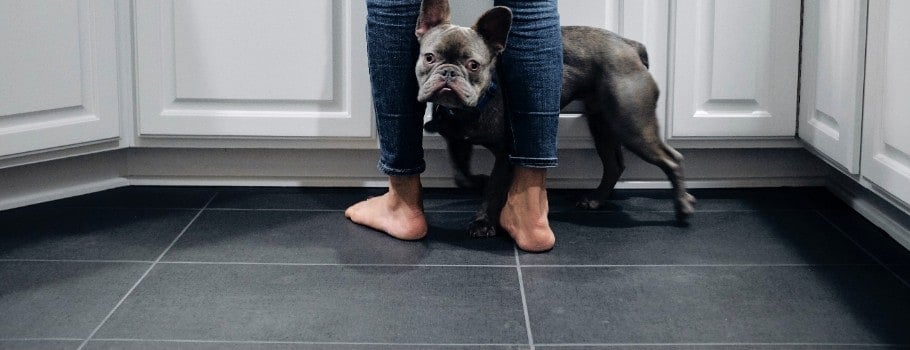
What Should I Use To Clean Stone Floors?
Stone floors can be a stunning addition to any home, but keeping them clean requires the right approach and products. Here’s a friendly guide to help you keep your stone floors looking pristine! Be sure to avoid abrasive cleaners, as they can scratch and ruin the surface. Instead, opt for pH-neutral solutions or mild soaps to maintain the integrity of the stone.
Natural Cleaning Solutions with pH Neutral Cleaner
When it comes to choosing the best cleaner for stone floors, many homeowners prefer natural solutions. A simple mix of warm water and a small amount of mild dish soap can work wonders on most stone surfaces. Additionally, a gentle mixture of baking soda and water can tackle minor stains and provide a mild abrasive effect without damaging the stone. It is crucial to use safe products to clean natural stone floors to maintain their natural beauty and ensure their longevity.
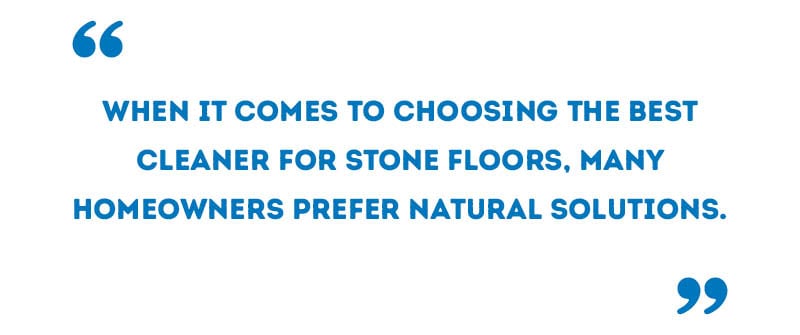
Recommended Cleaning Tools
Your stone floors deserve the best tools, so consider investing in a high-quality stone floor mop. Opt for a mop with a soft microfiber head to avoid scratches. A vacuum with a hard floor setting is also excellent for keeping dirt and grit at bay, preventing them from embedding in the stone and causing harm. Avoid using steel wool as it can be abrasive and scratch the stone surface.
Special Considerations for Different Stone Types
Different types of stone may require different cleaning methods. For example, marble is more delicate and can be scratched more easily than granite. Always test your cleaning solution on a small, inconspicuous area first. Slate floors, on the other hand, may benefit from periodic sealing to protect them from moisture and stains.
Remember, with the right care and attention, your stone floors will remain a beautiful and durable feature in your home for years to come. Always use products designed specifically for stone and avoid harsh chemicals that could cause damage. It is especially important to use suitable cleaners for natural stones to maintain their appearance and longevity.
Is Vinegar Good For Cleaning Stone Floors?
When it comes to cleaning stone floors, you might be tempted to reach for a bottle of vinegar thanks to its reputation as a powerful natural cleaner. However, before you pour that vinegar onto your prized stone floors, let’s weigh the pros and cons. Additionally, avoid using lemon juice due to its acidic nature, as it can cause damage to stone surfaces if left for extended periods.
Pros and Cons of Using Vinegar
Pros:
- Vinegar is known for its strong cleaning power and ability to cut through grime and organic build-up.
- It’s also a natural, eco-friendly alternative to many commercial cleaners, which aligns perfectly with a sustainable cleaning approach.
Cons:
- Unfortunately, vinegar is acidic, and stone floors, especially those made of marble, limestone, or travertine, are very sensitive to acids.
- The acid in vinegar can react with the calcium carbonate in these stones, potentially leading to etching, dulling, or even damage over time.
Alternative Natural Cleaners
If you want to clean your stone floors naturally without risking damage, there are several alternatives:
- Baking Soda Solution: Mix a small amount of baking soda with water to create a gentle yet effective cleaning paste.
- Castile Soap: This plant-based soap is another fantastic option. Mix a few drops with warm water for an all-purpose stone floor cleaner.
- Essential Oils: Adding a few drops of tea tree or lavender oil to your cleaning solution can enhance its antibacterial properties.
- Microfiber Cloth: Using a damp microfiber cloth or mop with water alone can often be enough for light cleaning and maintenance.
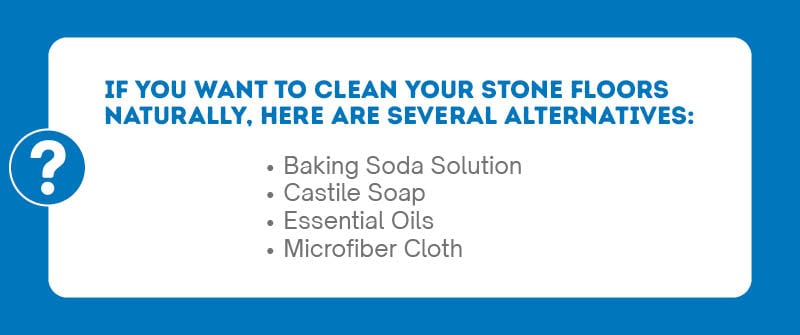
Precautions and Safety Tips
To ensure your stone floors remain pristine:
- Always dilute your cleaners sufficiently to prevent any harsh effects.
- Perform a patch test on a small, inconspicuous area before full-scale cleaning.
- Immediately wipe up any spills, especially acidic ones such as juice or coffee, to prevent staining and etching.
- Avoid using any abrasive cleaning tools, which can scratch and damage the stone surface.
By choosing the right natural cleaners and following these safety tips, you can keep your stone floors looking beautiful without resorting to harsh chemicals or risky solutions like vinegar.
Why Is My Stone Floor Always Dirty?
Does it feel like no matter how often you clean, your stone floors still look a bit dusty and grimy? You’re not alone! Let’s dive into some of the common causes and what you can do to tackle them effectively.
Common Causes of Dirty Stone Floors
Stone floors are naturally porous, which means they can easily trap dirt, dust, and grime. Over time, these contaminants can settle into the tiny crevices and create a dull appearance. Moreover, if your stone floors aren’t sealed correctly, they can absorb spills, leading to stains that are challenging to remove. Proper maintenance of natural stone floors, including regular cleaning and sealing, is essential to protect these surfaces from damage and ensure their longevity and aesthetic appeal.
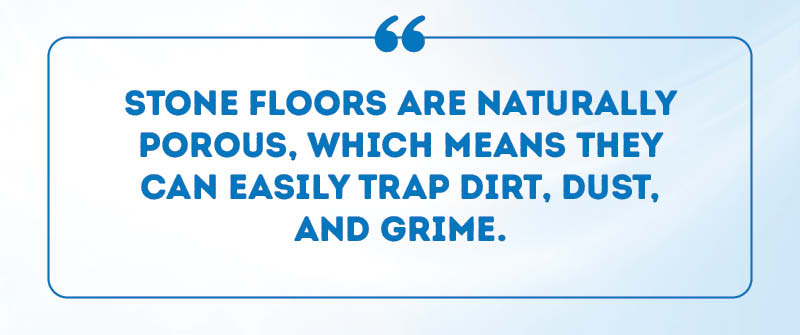
Foot Traffic
High foot traffic areas are particularly prone to getting dirty faster. Shoes bring in all sorts of debris, from dust and dirt to more stubborn contaminants like mud and oils.
Incorrect Cleaning Methods
Using the wrong cleaners can also contribute to your stone floors looking perpetually dirty. Some cleaning agents can leave a residue that attracts dirt, making your efforts counterproductive.
Daily Maintenance Tips
Consistency is key when it comes to keeping your stone floors clean. Here are some practical tips for daily upkeep:
Sweeping and Vacuuming
Regularly sweep or vacuum your floors to remove loose dirt and debris. Make sure your vacuum cleaner is set to a hard floor setting to avoid scratching your beautiful stone surface.
Mopping
Use a damp mop with a pH-neutral cleaner such as Quick Shine Multi-Surface Floor Cleaner to wipe down your floors. Avoid overly wet mops; excessive water can seep into the stone and grout, causing additional issues over time. To clean natural stone tiles effectively, always use stone-friendly cleaners and avoid harsh chemicals like bleach.
Best Practices for Preventing Dirt and Grime Buildup
Preventive measures go a long way in maintaining clean stone floors. These best practices are easy to implement and highly effective:
Use Mats and Rugs
Place mats and rugs at entry points to reduce the amount of dirt that gets tracked onto your floors. This simple addition can significantly minimize the dirt that enters your home.
Regular Sealing
Ensure your stone floors are sealed correctly. Sealing helps to fill in the porous surfaces, making them less prone to trapping dirt and grime. Depending on the type of stone, you might need to reseal every 12 to 18 months.
Avoid Harsh Cleaners
Stick to pH-neutral or specially formulated stone cleaners such as Quick Shine Multi-Surface Floor Cleaner. Harsh chemicals can damage the stone and make it more susceptible to dirt buildup. It is crucial to use appropriate cleaning methods for stone floor tiles to preserve their appearance and longevity.
Follow these tips, and your stone floors will stay sparkling clean for longer, saving you time and effort in the long run!
How Do You Clean Stained Stone Floors?
Stone floors are a beautiful and durable choice for many homes, but they can sometimes become stained and lose their natural luster. Understanding how to effectively clean and treat these stains is essential to maintaining the elegance of your stone flooring. Proper cleaning techniques for natural stone surfaces are crucial to preserve their beauty and longevity.
Identifying Different Types of Stains
The first step in treating stained stone floors is identifying the type of stain you are dealing with. Organic stains, such as those from food, plant debris, or pet accidents, can often be treated differently from inorganic stains, like rust or ink. Each type of stone, whether it’s granite, marble, or slate, has its own unique cleaning requirements. It is crucial to understand the specific cleaning needs of each type of natural stone floor to ensure proper maintenance and longevity.
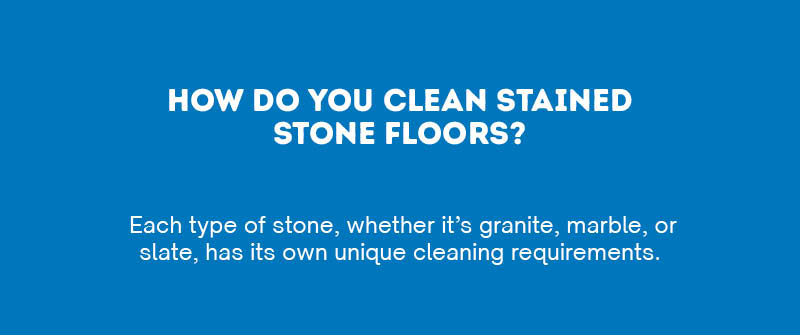
Effective Stain Removal Techniques
Steam cleaning stone floors is one of the most effective methods for deep cleaning and removing stubborn stains without the need for harsh chemicals. A steam cleaner can penetrate the pores of the stone, loosening and lifting even the most ground-in dirt and grime.
For organic stains, Quick Shine Multi-Surface Floor Cleaner with a damp microfiber mop can often do the trick. Apply the solution to the stained area, let it sit for a few minutes, then mop. Avoid using abrasive pads or brushes, as they can scratch the surface of the stone.
In the case of inorganic stains, such as rust or mineral deposits, a poultice made from baking soda and water can be effective. Apply the paste to the stain, cover it with plastic wrap, and let it sit for 24 hours before gently scrubbing and rinsing.
Using Steam Cleaners for Deep Cleaning
Steam cleaning is particularly useful for tackling tough stains on stone floors. The steam cleaner works by heating water to a high temperature and releasing it as steam, which penetrates the surface of the stone to dislodge dirt and grime. It’s a chemical-free way to clean, making it safe for both your family and the environment.
Special Tips for Outdoor and Bathroom Stone Floors
Outdoor stone floors can gather more stubborn dirt and grime due to their exposure to the elements. Regular sweeping and occasional power washing can help keep these areas clean. For porous stone bathroom tiles, it’s essential to address mold and mildew promptly. A natural solution of vinegar and baking soda can effectively clean and disinfect these areas but remember to rinse thoroughly to avoid leaving any residue.
To keep your stone floors looking their best, it’s vital to develop a regular cleaning and maintenance routine. By using the right techniques and tools, you can easily manage and remove stains, keeping your floors pristine and beautiful for years to come.
To clean Natural Stone, simply follow the steps below to maintain and enjoy your floors for a lifetime.
- Sweep off surface debris. Dry dust frequently to prevent surface scratches. If you are cleaning a natural stone floor, you’ll want to use a plush microfiber pad like this one.
- Simply squirt or spray Quick Shine® Multi-Surface Floor Cleaner onto your floor
- Spread with a freshly rinsed microfiber mop
- Rinse the pad frequently to release soil
Enhance your cleaning routine with Quick Shine’s eco-friendly, pH-neutral solutions, designed to effortlessly maintain the natural beauty of your stone floors. Let us empower your home with sparkling, clean floors that stand the test of time.
Quick Shine® Multi-Surface Floor Cleaner dries quickly so there is no need to manually dry your floors. It’s the best cleaner for stone floors. It’s as easy as Spray. Mop. Done. Our Cleaner works great in spray mops too! No Bucket. No Mess. Simply Clean Floors. The big bonus here is that you are also cleaning with a Safer Choice product so you can rest easy knowing the cleaner you use will not leave toxic residue behind that can harm your children or pets.
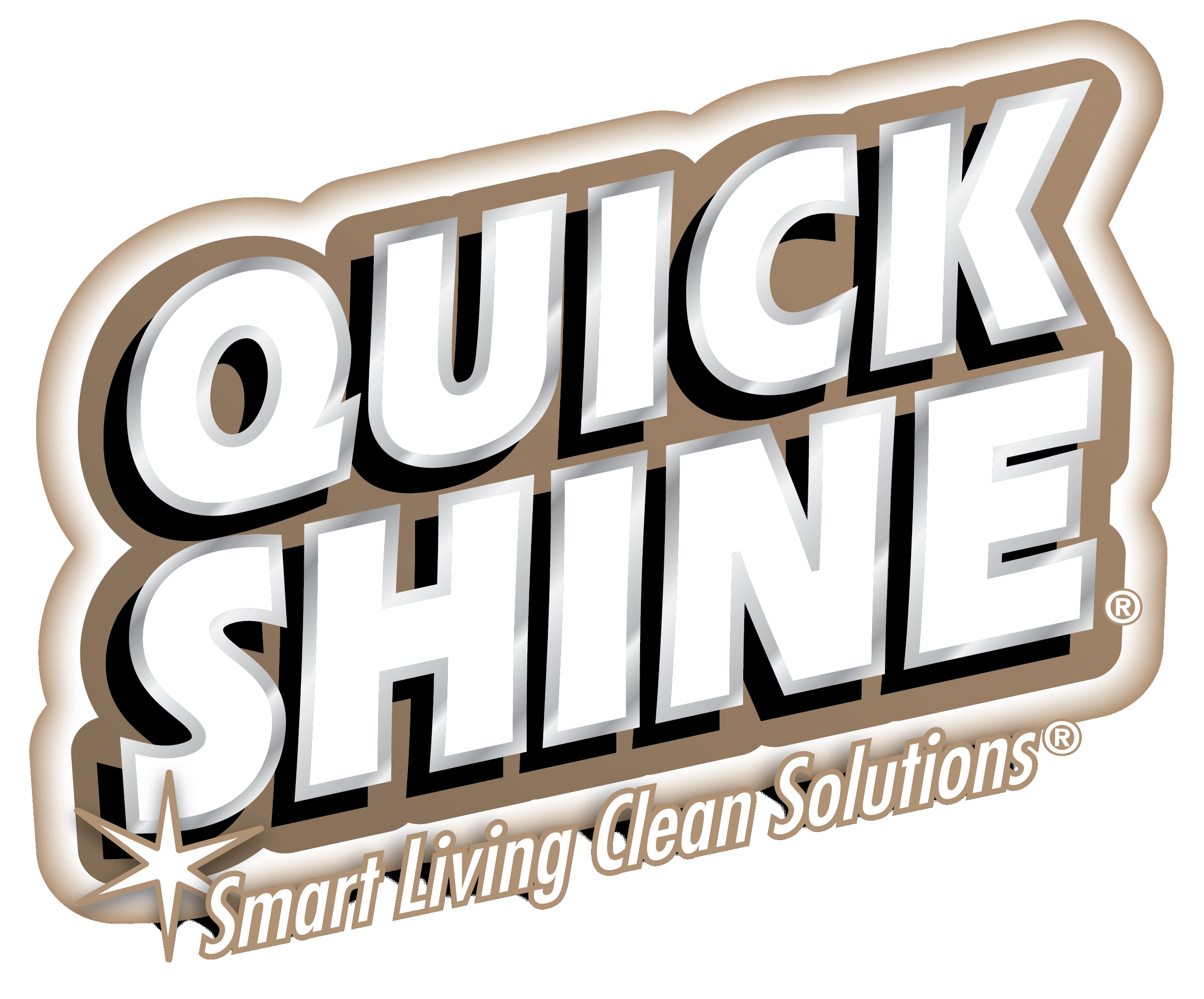
I have granite counter tops some of them lets liquids/lotions penetrate and cause stains. Do you have a product that will help remove the stains? Thanks.
Hi Lois,
Unfortunately if the surface was not sealed we do not have a safe remover to recommend.
Lois,
You may try using a steamer to draw out the stain (for example a clothes steamer) although this method is not guaranteed to work either. Hope this helps!
Which Holloway product is used to shine marble floors?
Hi Ana,
We recommend using Quick Shine Multi-Surface Floor Finish (green label) to shine your marble floors.
Newly polished and sealed concrete residential floors, radiant heat, which product(s) to clean and add gloss/protection?
Also, ingredients truly non toxic for babies and pets?
Yes, our Quick Shine products have gone through extensive third party testing to be deemed non-toxic and safer for kids, pets and our environment. For your sealed concrete floors we recommend Quick Shine Multi-Surface Floor Cleaner and Quick Shine Multi-Surface Floor Finish for a long-lasting beautiful shine! The Finish will add the gloss protection you are looking for and the Cleaner will maintain that shine as it is compatible and will not dull the Finish. We do recommend turning off your radiant heat floors during application (preferably leaving it off for a few days as it fully cures) when applying our Finish. Shine On!!
Thanks, Steven…want to begin by cleaning off the construction dirt, I assume your cleaner alone will suffice and not damage the (unknown)sealer/finish applied by the contractor?
Our Cleaner is pH neutral but effective at moving any surface dirt from construction. It is important to test an area first to assure satisfactory results. Also, we recommend rinsing the mop pad frequently to avoid any streaking of dust from the construction.